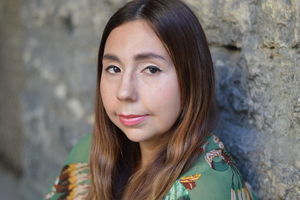Frances Koncan on How Playwrighting Gets Her "Closest to the Truth"
Frances Koncan's play, Women of the Fur Trade (Playwrights Canada Press) is the antidote to dull historical renditions of early Canada. Set in "eighteen hundred and something something", it follows three nineteenth century women—one Metis, one Ojibwe, and one British—who gather in Treaty One Territory for a hilarious and satirical but also sharply insightful retelling of the time of Manitoba's formation and events related to the Red River Resistance.
With appearances from "hot nerd" Louis Riel, astrological matchmaking, 21st-century slang, and plenty of romantic and social intrigue, Women of the Fur Trade is funny, vibrant, and searingly smart. Koncan, who is of Anishinaabe and Slovene descent, brings to the forefront the voices of women, and especially Indigenous women, whose work and lives shaped so much of Manitoba's history but who are seldom mentioned in contemporary retellings.
Koncan joins us today to talk about her writing process, telling us about their limited but influential early theatre going experiences (which will resonate for 90s kids), sharing an extremely relatable (and wryly honest) coping method for tough writing times, and explaining why, for her, plays are both the toughest and most essential form in which to write.
Open Book:
Do you remember an early experience that you believe contributed to your becoming a playwright?
Frances Koncan:
The first play I ever wrote, I was working in the box office at the Royal Manitoba Theatre Centre. It was a slow Saturday, and the only games we had on the computers was Minesweeper, which I found way too stressful to play. Sometimes, my co-workers would join in and read them. It made me laugh when they laughed, and I like to laugh, so I kept writing.
OB:
What is the first play you remember being affected by, and how did you happen to see or read it?
FC:
I didn't have the opportunity to see much theatre as a kid but was always reading books and watching movies and TV shows. I used to read and watch the same things over and over again, which in retrospect was a great way to learn about storytelling. For theatre, I remember seeing The Phantom of the Opera almost every night when it was touring in Winnipeg. I think that's probably when it all started.
OB:
Is your writing process totally page-based, or do you sometimes speak dialogue aloud (alone or with others) or try physically blocking out scenes while writing to work through things?
FC:
I have no idea what my writing process is and the fact that other writers have a process makes me feel like a total imposter. It's never been the same from project to project. But the key components are always a) avoiding writing and b) crying.
OB:
What one play, from any time period, do you wish you had been the one to write?
Your CanLit News
Subscribe to Open Book’s newsletter to get local book events, literary content, writing tips, and more in your inbox
FC:
Angels in America! Like, of course an Angel can crash through a ceiling? Why didn't anyone else think of that before? And now it's been done, so we can't do it again? But it was so good? And a billion hours long? TWO PARTS?
OB:
What do you do with a play in progress or a scene that just isn't working?
FC:
Panic and complain on social media until someone compliments me.
OB:
What was the last play that you saw or read that really knocked your socks off?
FC:
Norma Jeane Baker of Troy by Anne Carson. I saw it a few years ago and it kept lingering in my mind, so I finally bought a copy. I don't think I understand it anymore than I did before reading it, but it's still always on my mind, and I like that more than understanding.
OB:
What is the worst thing about being a playwright, and what is the best?
FC:
For me, playwriting is the form of writing that feels like it gets me closest to the truth or some kind of monumental discovery or inner peace or whatever. It's deeply satisfying to write plays. It would be nice if it paid better (or at all, sometimes). And it's disappointing that it isn't a particularly respected skill – for me, a play is the hardest thing to write. I'd never do it if I didn't feel like I had to.
___________________________________________
Frances Koncan is a writer of mixed Anishinaabe and Slovene descent from Couchiching First Nation in Treaty 3 territory, and currently living and working on Treaty 1 territory in Winnipeg, Manitoba. She learned to write by fighting with adults on the Internet in the late ’90s before Internet safety was a consideration. Their theatrical career began in 2007 when they saw a production of The Threepenny Opera starring Alan Cumming and he accidently touched her shoulder. In her free time, she likes playing video games and adding expensive luxury goods to her online shopping cart with no intention of ever checking out.





